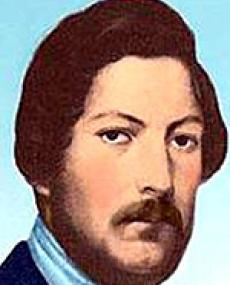
Voortrekker leader after whom Pretoria was named.
Andries Wilhelmus Jacobus Pretorius was born on 27 November 1798 near Graaff-Reinet in the Cape Colony. He was educated by travelling teachers and became an eloquent speaker and writer in his later life.
By 1837 he still lived in Graaff Reinet and owned farms in the district. He became interested in the planning of the Great Trek and even went on a preliminary trip to the interior before he decided to take part in the migration in 1838. He took part in several battles in Natal and bought a farm near Port Natal, or Durban, as it is known today. He only returned to Graaff Reinet to sell his remaining property.
At this time Voortrekker leader Piet Retief and several hundred kinsmen were killed on the orders of Zulu King Dingane following a failed land exchange agreement. Pretorius had advanced to a position of Commandant-General in the Boer army and was asked to lead an expedition against the Zulu leader to avenge the murder of Retief. He accepted and reached the main Voortrekker camp in Natal on 22 November 1838.
On 9 December 1838 the Voortrekkers made a covenant with God to celebrate the day of their triumph over the Zulu every year as a holy day, should they be granted victory. On 16 December led 464 men against Dingane and his warriors near the Ncome River. About 3 500 of the 5 000 Zulu warriors were killed, marking a major blow for Zulu dominance of the region.
The battle location is known as Blood River. Legend has it that the Ncome River turned red with the blood of so many casualties. In keeping with a pre-battle oath, the anniversary of the event was commemorated by Afrikaners as the Day of the Covenant. The Voortrekkers decided to establish a republic on the land Dingane had granted them under the leadership of Pretorius. In 1840 Pretorius joined forces with Dingane's brother, Mpande and defeated Dingane at Magono.
The British had left the area and the Voortrekkers had the independence they had fought for. Within three years the imperial forces returned but Pretorius defeated them. In 1842 Britain annexed Natal, with the Transvaal following in 1848.
In 1847 Pretorius, who had settled near Pietermaritzburg, resigned as leader of the Voortrekkers and became a British subject. He travelled to Grahamstown to discuss the complaints of the Natal Voortrekkers with Sir Henry Pottinger, the British representative in the area. Pottinger refused to see him and enraged Pretorius while causing resentment throughout South Africa. Pottinger's successor, Sir Harry Smith, did meet with Pretorius in 1848, but the discussion was unsatisfactory for both groups.
Smith felt that Natal should remain a British colony while Pretorius supported total independence. The disagreement was so strong that Pretorius and his followers rejected their commitment to Britain. He moved to Rustenburg in the Transvaal and launched a campaign against imperial England. He was declared a rebel with a reward of 2 000 pounds offered for his capture.
At the time there were three factions within the Transvaal Voortrekkers. One group supported Pretorius, while another followed Andries Potgieter with the third in support of the Volksraad. Pretorius felt that these issues could not be resolved unless the Transvaal became an independent republic. He initiated talks with the British government in this regard. He could not join the deputation, as he was still an outlaw. He had been invited by the Voortrekkers to be part of the group in August 1851 and informed the British government of this.
The bounty on his head was reversed and the British crown appointed two commissioners to negotiate a settlement with the Voortrekkers living to the north of the Vaal River. In 1852 he participated in the Sand River Convention, which went ahead without the blessing of the Volksraad. On 17 January 1852 Britain agreed to recognise the independence of the Transvaal.
Pretorius was highly regarded by both the British and local Black leaders and when he died in Magaliesberg on 23 July 1853 many of them visited him to pay their last respects.